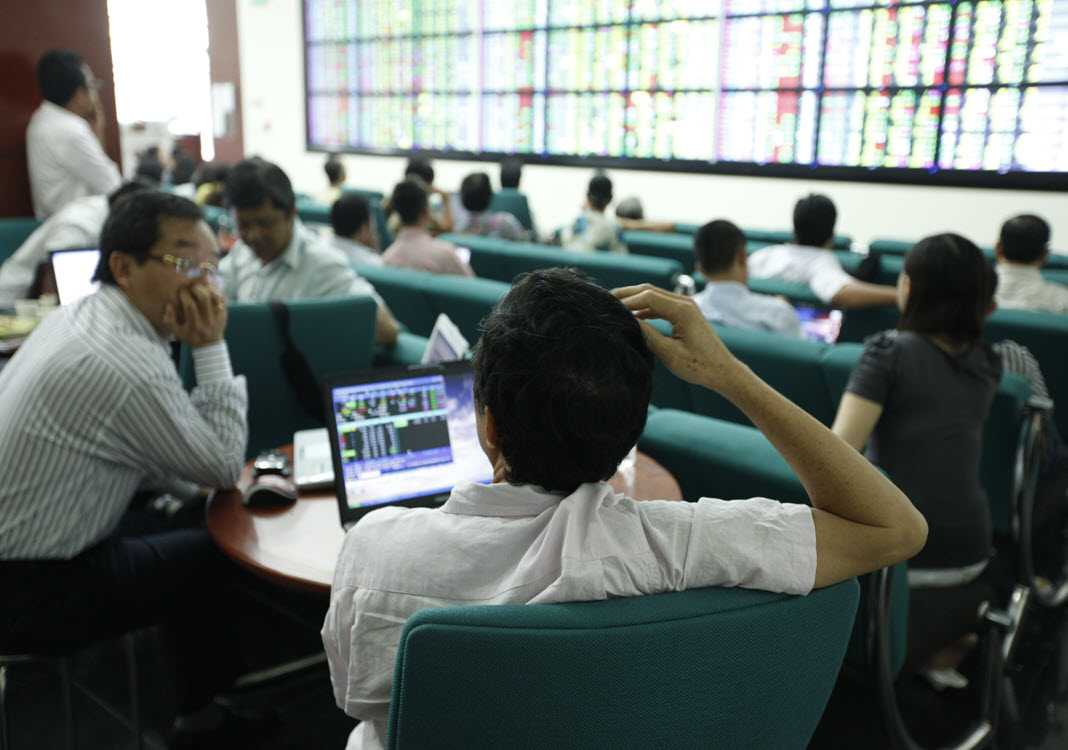Vietnam’s stock market is under great pressure amid concerns over the resurgence of the Covid-19 outbreak. Would the correction this time prevent the market from a nosedive as experienced in March?
In Q1, the VN-Index at times lost as much as 10% during three brief trading sessions after the Lunar New Year Festival. The index later made a slight recovery and moved flat until end-February before plunging more than 30% throughout March and bottoming out at 650 points on the last day of the month.
In the current outbreak of the pandemic, the VN-Index rapidly dipped as much as 9% during only two trading sessions on July 24 and 27. However, the market made positive recovery shortly afterwards. Still, pessimistic investors do not rule out the possibility that the market is undergoing the same development as that in February and March, with slight recovery and flat movement before unpredictable slumps.
Their concern is understandable, as the current outbreak shows sign of faster transmission from the source originating from hospitals and the tourist city of Danang. Tourists returning from Danang in late July are potential infectors, and the reality is true.
Up to now, the authorities have not yet found the F0 patient in Danang, while test results of the genes of new patients show that the disease is caused by an invasive coronavirus with faster transmission than other strains of coronavirus recorded previously. The representative of the World Health Organization (WHO) in Vietnam said the coronavirus found in Danang is similar to the virus spread in other countries in July and has the same virulence.
More seriously, the first cases of Covid-19 related deaths have been recorded in Vietnam though they seem to be predictable consequences, as most Covid-19 patients in Danang are under treatment and have serious underlying health conditions.
However, a more serious concern is illegal immigrants with potential infection into many localities in Vietnam. Without early prevention measures, it will heighten fear, affecting socio-economic activities as well as financial markets.

Different fundamental factors
Nevertheless, a comparison of two periods of the Covid-19 outbreak indicates that the fundamental factors in the current outbreak are different from those in the previous outbreak with more positive features. First, in the two months of February and March, the global stock market, inclusive of those in Asia, Europe and Americas, was on freefall with the Dow Jones index frequently losing thousands of points during some sessions, while in the current time, the global stock market is in positive recovery thanks to relaxed policies despite out-of-control Covid-19 outbreaks. It seems that international investors are immune to the Covid-19 fear.
The Dow Jones index recently fell slightly 0.2% while the S&P 500 rose 1.7% and the Nasdaq 3.7%. In all, the Dow Jones increased 2.3% in July, the S&P 500 5.5% and the Nasdaq 6.8%, with the strong surge of technology stocks thanks to positive business results in Q2.
Second, the trading strategy of foreign investors is different now. In February and March, they continuously net sold shares on all the three exchanges with a total value of nearly VND12 trillion, but made a net buy in the recent strong correction phase. Figures show that foreign investors net bought shares on all three exchanges in five consecutive sessions from July 24, when the market nosedived, to July 30 with a total value of VND1.155 trillion.
Of note, besides foreign investors, the proprietary trading groups of securities companies also performed net buy considerably. In the week from July 27 to 31, they bought shares worth more than VND87.3 billion, higher than the figure of VND38.1 billion in the previous week and marking the fourth consecutive week of net buy with a total value of over VND231.6 billion. The deep market fall seems to be a buying opportunity for foreign investors and proprietary trading groups.
Third, unlike the previous outbreak when authorities were surprised and confused in fighting Covid-19, the policies for fighting the pandemic and treating patients now are more orderly, experienced and systematic. From the economic view, in Q1 monetary easing and fiscal expansionary policies were just tabled for discussion to deal with the consequences and impacts of Covid-19, while in the present time, most of these policies have been put into practice to help the economy sustain shocks better and enterprises get more supports.
As an example, the current deposit rate has dropped to the lowest level in many years after three drastic cuts in mid-March, May and early July, paving the way for lower lending rates. Further, with the current unattractive deposit rates at banks, investment channels like securities can draw the money flow.
Still, given the complex, unpredictable developments of the pandemic while the market has passed the season of business result reports for Q2 with no information in the time ahead and the psychology of hesitation for trade in the heavy rainy season, investors may prefer day trading rather than long-term trading in the current situation.
By Ho Le











